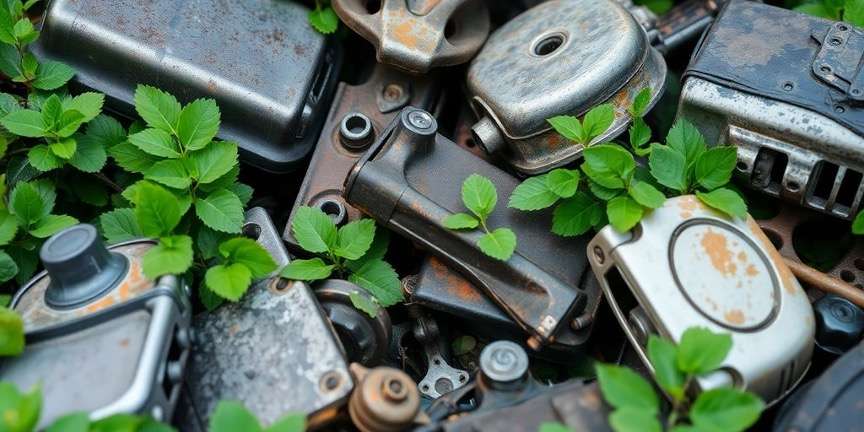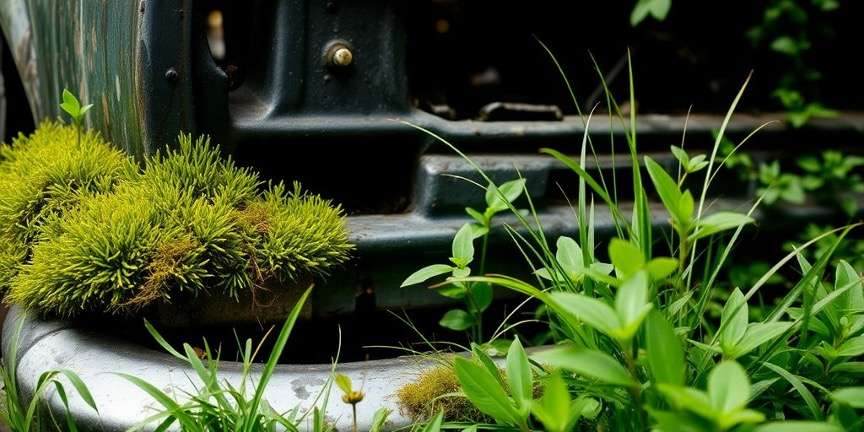Key Takeaways
- Recycling junk cars helps conserve natural resources by reusing materials like metal, reducing the need for new raw materials.
- It prevents pollution by ensuring hazardous fluids and parts are disposed of safely, protecting soil and water from contamination.
- The process reduces air pollution by minimizing the need for manufacturing new parts, which often involves burning fossil fuels.
- Junk car recycling decreases landfill waste, freeing up space and reducing harmful emissions like methane from decomposing materials.
- It supports local economies by creating jobs in the recycling industry and promoting sustainable practices.
Understanding the Environmental Impact of Junk Cars
The Problem with Abandoned Vehicles
Abandoned cars aren't just eyesores; they're a big problem for the environment. When cars are left to rust, they can leak hazardous fluids like oil and coolant. These substances can seep into the ground, contaminating soil and water sources. This not only harms local ecosystems but also poses risks to human health. Plus, these vehicles take up space that could be used for other purposes, contributing to urban blight.
Environmental Hazards of Junk Cars
Junk cars are more than just piles of metal. They contain many hazardous materials, including lead-acid batteries, mercury switches, and other toxic substances. If not disposed of properly, these materials can cause significant environmental damage. Proper recycling of junk cars helps to mitigate these risks by ensuring that dangerous materials are safely handled and disposed of.
The Importance of Responsible Disposal
Disposing of junk cars responsibly is crucial for protecting the environment. This means choosing a recycling service that knows how to handle the various components of a vehicle safely. By doing so, you're not only preventing pollution but also contributing to a more sustainable future. Recycling parts and materials plays a crucial role in minimizing resource extraction and energy consumption. This process not only conserves natural resources but also promotes sustainability by reusing valuable materials.
Recycling your junk car isn't just about getting rid of an old vehicle. It's about making a choice that benefits the environment and supports a sustainable future. By understanding the impact of junk cars and opting for responsible disposal, we can all contribute to a cleaner, healthier planet.
How Recycling Junk Cars Conserves Natural Resources
The Role of Metal Recycling
Recycling junk cars plays a big part in saving our natural resources, especially metals like steel and aluminum. When you recycle metal, you cut down on the need to dig up new raw materials, which is a win for the environment. This process uses a lot less energy compared to making new metal from scratch. In fact, recycling metal can use up to 74% less energy than producing new metal from ore. That's a huge energy saving!
Reducing the Need for New Raw Materials
When old cars are recycled, the demand for new raw materials drops significantly. This means less mining and less environmental damage. For every ton of steel recycled, about 2,500 pounds of iron ore, 1,400 pounds of coal, and 120 pounds of limestone are saved. By recycling junk cars, we not only conserve these resources but also help reduce the demand for raw materials, making the whole process more sustainable.
Energy Savings from Recycling
Recycling old cars isn't just about saving materials; it's also about saving energy. When you recycle, you use way less energy than if you were starting from scratch. For example, recycling steel requires about 60% less energy than producing new steel. This energy saving is critical for reducing the overall energy demand in the industrial sector. Plus, less energy use means fewer greenhouse gas emissions, which is a big step towards fighting climate change.
Recycling your junk car is like giving the planet a helping hand. By choosing to recycle, you're not just getting rid of an old vehicle, but you're also making a positive impact on the environment. It's a small step that leads to big changes.
Preventing Pollution Through Junk Car Recycling

Avoiding Soil and Water Contamination
When old cars are left abandoned, they start to leak harmful fluids like oil, antifreeze, and brake fluid. These substances can seep into the ground, contaminating soil and water. This not only harms local ecosystems but also poses a threat to human health. By choosing to recycle your junk car, you ensure these toxic fluids are safely removed and disposed of, protecting the environment.
Reducing Air Pollution
Recycling junk cars helps cut down on air pollution. How? Well, when car parts like engines and batteries are recycled, it reduces the need to produce new ones. Manufacturing new parts releases harmful emissions into the air. By recycling, we lower the demand for new parts and help reduce these emissions. It's a win-win for both the environment and the industry.
Safe Disposal of Hazardous Fluids
Junk cars often contain hazardous fluids that can be dangerous if not disposed of properly. Recycling facilities are equipped to handle these fluids safely, preventing them from leaking into the environment. This safe disposal is crucial in preventing pollution and protecting our natural resources.
Recycling your junk car not only helps the planet but also ensures that harmful substances are kept out of our soil and water. It's a simple yet effective way to contribute to a cleaner environment.
The Role of Junk Car Recycling in Reducing Landfill Waste

Impact on Landfill Space
Junk cars take up a lot of space in landfills, and their bulky nature means they don't break down easily. By recycling these vehicles, we free up valuable landfill space that can be used for other waste. Recycling a single car can save up to 2,500 pounds of iron ore, 1,400 pounds of coal, and 120 pounds of limestone. This not only conserves natural resources but also reduces the strain on landfill sites.
Methane Emissions from Landfills
Landfills are notorious for producing methane, a potent greenhouse gas that contributes significantly to global warming. When junk cars are left to rot in landfills, they can contribute to this problem. Recycling helps mitigate this issue by diverting waste away from landfills, thus reducing the methane emissions associated with decomposing materials.
Protecting Local Ecosystems
Landfills can have a devastating effect on local ecosystems. The heavy machinery used in landfills can destroy habitats, and the chemicals leached from waste can contaminate soil and water. By recycling junk cars, we help protect these ecosystems. This practice ensures that harmful substances like oil, antifreeze, and brake fluid are properly disposed of, preventing them from leaching into the environment. Car wreckers play a crucial role in this process by salvaging valuable components and reducing the amount of waste that ends up in landfills.
Economic and Community Benefits of Recycling Junk Cars
Job Creation in the Recycling Industry
Recycling junk cars isn't just about clearing up your backyard. It's a big deal for the local job market. When you recycle a car, you're supporting a whole industry that employs thousands of people. From the folks who tow the cars to the ones who strip them down for parts, every step creates jobs. This industry doesn't just help the environment; it helps families put food on the table. And with more people recycling their old cars, there's a steady demand for these jobs, which is great news for local economies.
Supporting Local Economies
When you recycle your junk car, you're doing more than just getting rid of an old clunker. You're giving a boost to your local economy. The money made from selling recycled parts often stays within the community. Local businesses, from scrapyards to parts dealers, benefit from this trade. Plus, consumers can save money by buying recycled auto parts, which are often cheaper than new ones. This keeps more money circulating locally, supporting small businesses and helping communities thrive.
Promoting a Circular Economy
Recycling junk cars is a cornerstone of the circular economy. This means we keep materials in use for as long as possible, cutting down on waste. Instead of letting old cars rust away, recycling turns them into resources for new products. This approach not only conserves materials but also inspires innovation in recycling technologies. By participating in this cycle, you're not just recycling a car; you're part of a movement towards a more sustainable future.
Recycling your junk car is more than an eco-friendly choice. It's a way to support your community, create jobs, and contribute to a sustainable economy. By choosing to recycle, you're part of a larger effort that benefits both people and the planet.
Innovations and Future Trends in Junk Car Recycling
Advancements in Recycling Technologies
The world of junk car recycling is buzzing with new technologies that make the process more efficient and environmentally friendly. Modern recyclers are now able to reclaim almost every part of a vehicle, thanks to innovative methods that have been developed over the years. For instance, advanced shredders and separators make it easier to sort and recycle metals from other materials. This means less waste ends up in landfills, and more materials are repurposed. Another exciting development is the use of automated systems that can dismantle cars faster and safer than human hands, reducing labor costs and increasing precision.
Sustainable Practices in the Automotive Industry
The auto industry is catching on to the importance of sustainability, and it's not just about making cars that run on alternative fuels. Manufacturers are beginning to design vehicles with recycling in mind. They're using materials that are easier to recycle and are looking at ways to make their production processes greener. This shift not only helps the planet but also makes economic sense. By reusing materials and reducing waste, companies can cut costs and improve their bottom line.
The Future of Vehicle Recycling
Looking ahead, the future of vehicle recycling is bright. We can expect to see more collaboration between car manufacturers and recycling companies, as they work together to create a more circular economy. This might involve designing cars that are easier to take apart or finding new uses for recycled materials. There's also potential for new policies and regulations that encourage recycling and penalize waste. Overall, the trend is moving towards a more sustainable and eco-friendly industry, where every part of a car's lifecycle is considered.
Conclusion
Recycling your junk car might seem like a small step, but it's a big win for the environment. When you decide to recycle, you're not just getting rid of an old vehicle; you're helping to save energy, conserve natural resources, and reduce pollution. It's like giving your car a second life, where its parts can be reused and repurposed, cutting down on the need for new materials. Plus, you're keeping harmful chemicals from leaking into the ground and water. So, next time you think about that rusty old car sitting in your driveway, remember that recycling it is a choice that benefits not just you, but the planet too. It's a simple action with a huge impact.
Frequently Asked Questions
Why is it important to recycle junk cars?
Recycling junk cars helps protect the environment by reducing pollution, saving energy, and conserving natural resources. It also keeps hazardous materials from harming the planet.
What happens to a car when it's recycled?
When a car is recycled, its parts are removed and either reused or melted down to make new products. This process helps reduce the need for new raw materials.
How does recycling junk cars save energy?
Recycling cars uses less energy compared to making new metal parts from scratch. This energy saving helps lower pollution and greenhouse gas emissions.
Can recycling junk cars help reduce landfill waste?
Yes, recycling junk cars keeps them out of landfills, which helps reduce landfill waste and prevents harmful chemicals from leaking into the ground.
What are the economic benefits of recycling junk cars?
Recycling junk cars creates jobs in the recycling industry and supports local economies. It also promotes a circular economy where materials are reused.
Are there any innovations in junk car recycling?
Yes, there are new technologies and practices that make recycling more efficient and environmentally friendly, helping to improve the recycling process.



